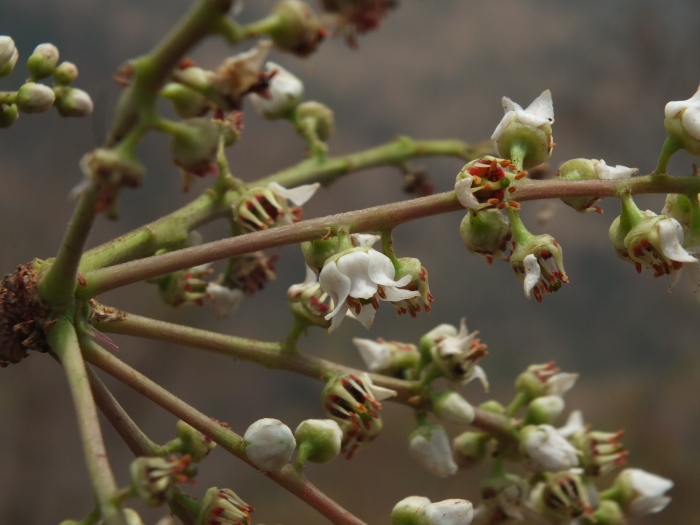Indian Frankincense
(Boswellia serrata)
Indian Frankincense (Boswellia serrata)
/
/

Siddarth Machado
CC BY 4.0
Image By:
Siddarth Machado
Recorded By:
Copyright:
CC BY 4.0
Copyright Notice:
Photo by: Siddarth Machado | License Type: CC BY 4.0 | License URL: http://creativecommons.org/licenses/by/4.0/ | Rights Holder: Siddarth Machado | Publisher: iNaturalist | Date Created: 2016-02-29T11:41:39-08:00 |


































Estimated Native Range
Summary
Boswellia serrata, commonly known as Indian Frankincense, is a deciduous tree native to the dry mountainous regions of India, particularly the Punjab region, as well as parts of Pakistan. It is also found in rocky terrain and scrub forests, which are often characterized by poor soil and limited moisture. This species can reach up to 12 meters in height and has a spreading, irregular crown. The bark is distinctive, with its papery flakes revealing greenish patches underneath. Boswellia serrata produces small white or pale pink flowers, which are not particularly showy, but they do contribute to the local ecology by providing nectar for insects. The tree is best known for its aromatic resin, which has been harvested for centuries.
Indian Frankincense is valued for its resin, which is tapped from the bark and used to produce incense and medicinal extracts. The boswellic acids contained in the resin are of particular interest for their anti-inflammatory properties and potential benefits in treating conditions like osteoarthritis and improving joint function. In cultivation, Boswellia serrata requires well-drained soil, can tolerate drought once established, and prefers full sun to partial shade. It is not commonly grown in gardens but is rather harvested in the wild, which has led to concerns about sustainability. Efforts are being made to cultivate it sustainably and to educate harvesters on responsible practices.CC BY-SA 4.0
Indian Frankincense is valued for its resin, which is tapped from the bark and used to produce incense and medicinal extracts. The boswellic acids contained in the resin are of particular interest for their anti-inflammatory properties and potential benefits in treating conditions like osteoarthritis and improving joint function. In cultivation, Boswellia serrata requires well-drained soil, can tolerate drought once established, and prefers full sun to partial shade. It is not commonly grown in gardens but is rather harvested in the wild, which has led to concerns about sustainability. Efforts are being made to cultivate it sustainably and to educate harvesters on responsible practices.CC BY-SA 4.0
Plant Description
- Plant Type: Tree
- Height: 8-25 feet
- Width: 10-20 feet
- Growth Rate: Slow
- Flower Color: Pink, White
- Flowering Season: Spring
- Leaf Retention: Deciduous
Growth Requirements
- Sun: Full Sun, Part Shade
- Water: Low, Medium
- Drainage: Fast, Medium
Common Uses
Drought Tolerant, Fragrant
Natural Habitat
Dry mountainous regions and rocky terrain with scrub forests
Other Names
Common Names: Sallaki, Indian Olibanum-Tree, Lobhan, Salakhi, Boswellia, Kundur Luban, Salai
Scientific Names: , Boswellia serrata, Boswellia glabra, Boswellia hirsuta, Boswellia serrata var. bivalvis, Boswellia serrata var. glabra, Boswellia thurifera, Libanotus asiaticus, Libanus thurifer, Libanus thuriferus,
GBIF Accepted Name: